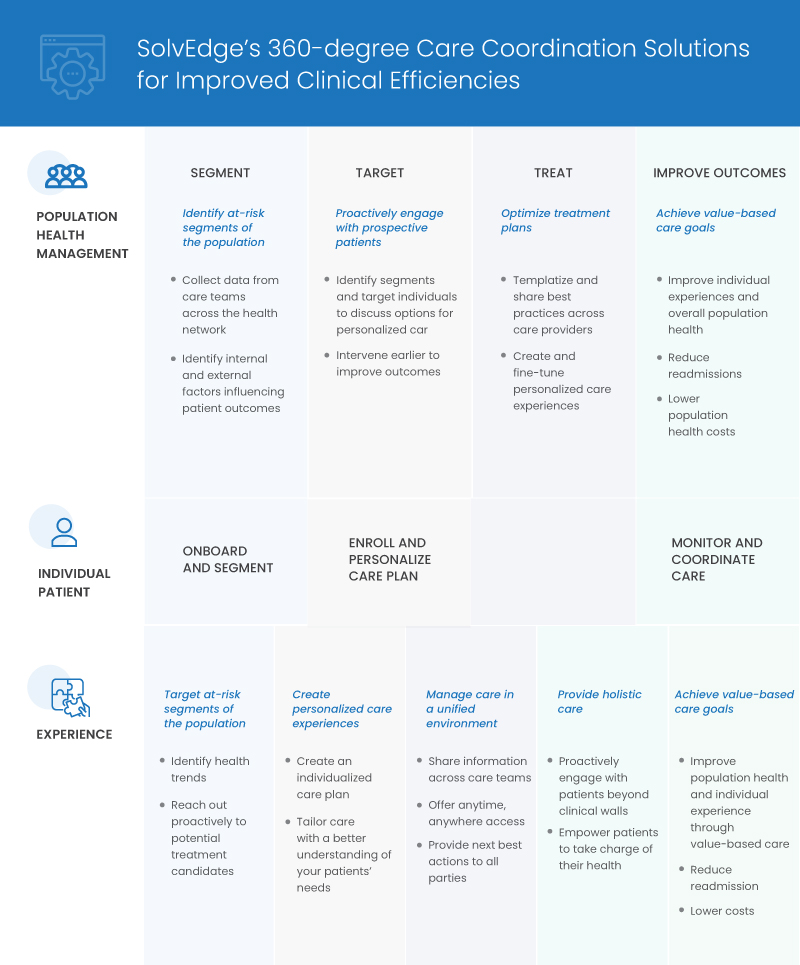Optimizing Clinical Efficiencies through Holistic Care Coordination Solution
- SolvEdge
- Nov 24, 2020
- 4 mins read

In the era of consumerism, healthcare consumers are experiencing superior and hyper-personalized Customer Experiences (CX) in industries like retail, banking and other sectors—and they expect the same from their care providers as well. However, research reveals that Patient Experience (PX) in the current healthcare landscape is far from perfect. How do healthcare leaders leverage their sphere of influence to drive clinical efficiencies as part of the broader spectrum of Triple Aim (Clinical, operational and financial excellence?) — Care coordination solutions.
Despite the paradigm shift to value-based care, the current care coordination ecosystem faces adverse challenges including communication gaps, fragmented care and redundant services. Consider the fact that the cost of uncoordinated care is a staggering 75% higher for patients than whose care is coordinated. A thoughtfully designed care coordination strategy that encapsulates the essence of the three key components illustrated below—can transform PX, drive engagement and loyalty, while seamlessly helping care providers achieve the Triple Aim of accelerating clinical, financial and operational efficiency.
1. Understand your population to manage the population’s health risks effectively.
Population health is a significant part of new health outcome strategies. The Affordable Care Act (ACA) or Obamacare has bolstered healthcare organizations to deliver superior, personalized and cohesive care in the most efficient manner, which is not as easy as it sounds. The new incentive and penalty plan of the healthcare ecosystem has its pros and cons. To maximize our new value-based care models efficiencies organizations need actionable insights on populations and the opportunities and risk factors involved within those populations. For instance, healthcare organizations require a different approach between serving an elderly rural community and a younger urban population. Similarly, the engagement strategies will also be unique and customized based on their specific needs.
2. Invest in personalized care.
While customized and personalized healthcare may sound expensive, these are critical in realizing the clinical, operational and financial benefits. To achieve their financial goals, organizations need to carve the strategies, KPIs and desired outcomes—to measure performance against the goals, and continually adjust processes to align with the changing regulations and evolving best practices.
A focused and strategic approach of the admin staff brings value to the care coordination process. Care coordinators need to leverage the right patient engagement solutions, analytical insights and streamlined workflows to ensure timely interventions and optimized outcomes. Our patient-centric approach supports your pursuit of consistent, cohesive and coordinated care.
3. Prepare for the shift to new reimbursement models
With changing regulations and policies, today, payers try to gain an edge over care management. The healthcare community must take the center stage—for the shift from Fee for Service (FFS) to a value-based model to succeed.
Care providers can think that the move to value-based care could disrupt their existing workflows and have a negative financial impact. This may seem overwhelming especially for physicians and small practices who just want to stay focused on patient care. However, the whole concept of value-based care and population management is all about patient care and driving up the health economics.

Read other articles in this patient engagement series:
To learn more about SolvEdge’s patient engagement solutions or to get a free and personalized strategic consulting on care coordination solutions, give us a shout!